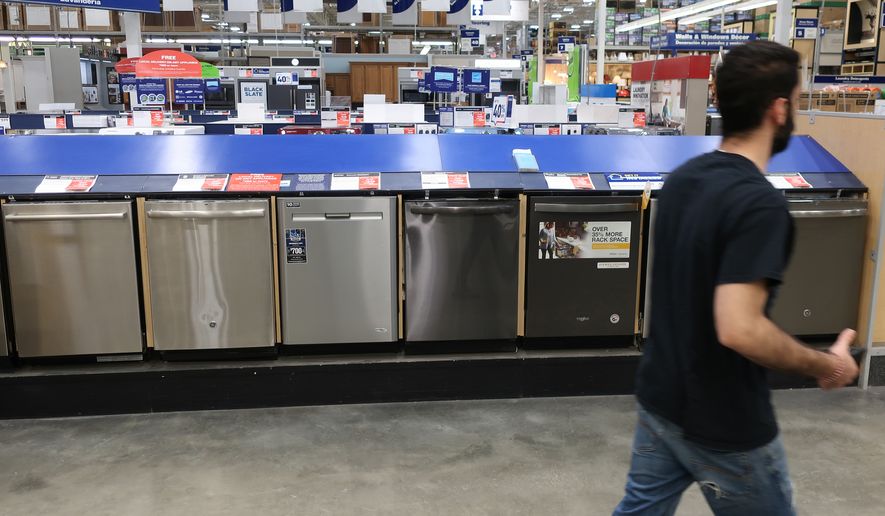The Department of Energy on Friday quietly released proposed efficiency rules for dishwashers that would reduce water use by more than one-third for some standard-sized machines and slash energy use by 27%.
The proposed standards mark the most significant energy crackdown on dishwashers in a decade and come as the appliance manufacturing industry is struggling to comply with a plethora of Biden administration rules aimed at boosting energy efficiency and cutting carbon emissions.
The new standards would reduce water use even in many dishwashers that now meet the federal government’s 3.5-gallon Energy Star Standard.
Under the proposed rule, which would take effect three years after it is finalized, dishwashers would have to reduce water use to 3.2 gallons per cycle. Federal law currently allows dishwashers to use up to 5 gallons per cycle and those models face the steepest cuts in water and energy use. They would be eliminated from the market unless redesigned for reduced water levels.
Manufacturers would also be required to cut energy use in standard dishwashers from 307-kilowatt hours annually to 223 yearly kilowatt hours.
New rules were proposed for compact dishwashers as well, cutting use from 222 kilowatt hours allowed annually under federal law to 174 kilowatt hours. Compact dishwasher water use would be capped at 3.1 gallons per cycle, down from the current allowance of 3.5 gallons.
According to the Association of Home Appliance Manufacturers, many dishwashers on the market already meet Energy Star levels, but the new proposal goes further to cut water use and energy with an additional .03 gallon reduction from the 3.5 gallon Energy Star standard.
According to department officials, consumers would save $17 annually on energy and water costs for a standard-size dishwasher and it would make up for the likely higher cost of the appliance in 2.4 years.
According to the Energy Department, the new dishwasher standards “would save a significant amount of energy.” Over a 30-year period, the new standards would result in a 2.7% reduction in energy use and would yield a cumulative emissions reduction of 12.54 million metric tons of carbon dioxide, 3.38 thousand tons of sulfur dioxide, 25.25 thousand tons of nitrogen oxides, 112.88 thousand tons of methane, .09 thousand tons of nitrous oxide and .02 tons of mercury.
“DOE has tentatively concluded that the proposed standards represent the maximum improvement in energy efficiency that is technologically feasible and economically justified and would result in the significant conservation of energy,” agency officials wrote in the proposal.
Some dishwasher models already exceed the new standards, among them Bosch, which company officials say uses on average 3.15 gallons of water for each cycle.
The most common dishwasher water usage, however, is 3.5 gallons per cycle, which is higher than the proposed new rules.
Most dishwashers must redesign appliances to cut energy use.
A Whirlpool top-control, Energy Star model uses 270 kilowatts per hour annually, exceeding energy use under the proposed rule by more than 17%. A GE Adora Energy Star-rated stainless steel control top dishwasher exceeds both of the proposed standards, using 240 kilowatt hours a year and 3.5 gallons per cycle.
Manufacturers view the reductions in water and energy in the dishwasher proposals as less drastic than the new efficiency rules the department is mulling for washers, dryers and refrigerators.
Some manufacturers have warned the new standards impacting the trio of appliances will lead to reduced performance and much higher prices. It could also lead appliance manufacturers to move production outside of the U.S., where labor is cheaper.
Manufacturers have also warned reducing water and power in appliances has become increasingly difficult without impacting performance, or in the case of dishwashers, reducing how effectively they clean and dry dishes.
The Department of Energy states in the proposal that the stricter standards would not impact performance, but manufacturers have not yet publicly weighed in on the rules.
The department will hold an online hearing on the proposed rules on June 8 and will begin accepting public comments online and in writing.
• Susan Ferrechio can be reached at sferrechio@washingtontimes.com.




Please read our comment policy before commenting.